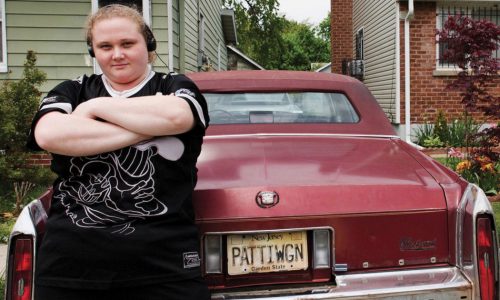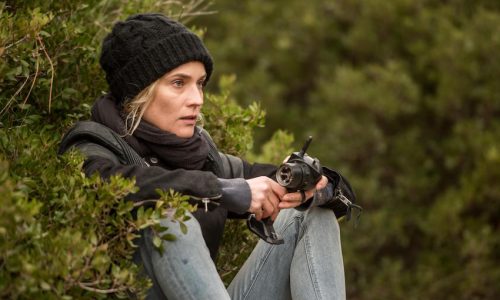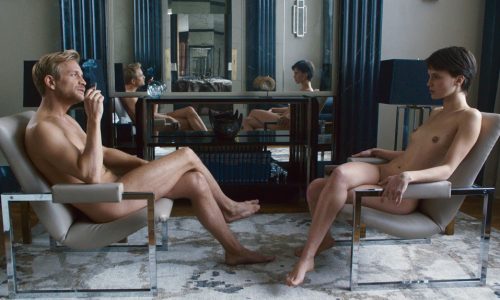
After another late night, I’d decided I’d need another late morning, but after someone drew my attention to an early screening of Patti Cakes, a Sundance success, playing in the Directors’ Fortnight strand, I decided to give it a go. It started at 8.45am, rather than the usual 8.30am, and was screening at the Marriott hotel, a 10 minute shorter walk away than the usual Lumiere at the Palais. I’d hoped that this extra 25 minutes would give me the energy I’d need to stay awake.

More correctly spelled Patti Cake$, this concerned me slightly, because punctuation is never good in titles and the film wasn’t about money. It was a low-budget coming-of-age film by a New Jersey director whose name has as controversial a spelling as his film title, Geremy Jasper – pronounced Jeremy. The Patti of the title, played by Australian Danielle Macdonald, is an overweight, white, blond girl with aspirations to become a rapper. Her character’s best friends include a black musician and an Asian pharmacist – together they set up their own band. It’s a formulaic but heart-felt tale of the central character trying to make something of herself through music, with some in her circle supporting her while others are less enthusiastic. After the screening, Jasper told the audience that he’d wanted to present “real people, who look like the people I grew up with.” The film was based on his time trying to become a musician, and something seems to have come of it – since the film first screened at Sundance, the team have signed a record deal and they’re in the studio, recording an album that’s due for release later in the year. Incongruous as it might seem, a white director writing a film based on his own experiences, centred on a white woman who wants to become a rapper? “In the suburbs of New Jersey, everyone listens to rap now,” he explained. “Rock doesn’t exist anymore.” Bon Jovi would be crying in their coffee.

I have an inbuilt bias against German films, not finding the language as appealing to the ears as the Romance family of French, Italian or Spanish or the punchy staccato sounds from the Far East. But every now and then, a German film comes along that cuts through that mindless prejudice. Last year’s Cannes hit Toni Erdmann was one such film and this year, I was intrigued by In The Fade, by the Turkish-descended German director Fatih Akin. Having Diane Kruger is always a draw and the subject matter of the aftermath of a terrorist bomb attack seemed frighteningly apt, just days after the Manchester suicide attack back home. Unexpectedly, this tale of a woman seeking justice for the murders of her husband and son turned out to be one of the strongest films of Cannes so far – from the point of view of its narrative, its message, its performances and its structure. It provides a fascinating and painfully moving insight into the lives of those left behind by terror and, unusually, this is a film where the muslims are the victims, not the perpetrators. It’s a tense, fatalistic masterpiece that works as both a tense thriller and a social critique.

With sales companies packing up and going home as early as last Monday, the market has just about been struggling along through the second week, thinning out day by day, but the last throw of the dice on Friday lunchtime, before the UK Film Centre packs up for another year is the annual Palme Dog awards ceremony. At this informal and – let’s be honest – tongue-in-cheek gathering, British critics honour the performances of dogs at Cannes. Previous winners have included Uggie from The Artist, but this year, the competition was particularly tough. Mirroring the official Cannes jury, the Palme Dog panel awarded its Grand Jury collar to Lupo the German Shepherd, from Léa Mysius’s Ava, which was screening in the Critics’ Week sidebar. But the overall winner was Bruno, Dustin Hoffman’s poodle in The Meyerowitz Stories.

One of the films I’d most been looking forward to was the latest from the always – or usually – reliable François Ozon, L’Amant Double. The psycho-sexual thriller pairs up Marine Vacth, Ozon’s young and beautiful leading lady from Jeune & Jolie, with the Belgian Jeremy Renner, Jérémie Renier, who plays her psychiatrist – and, as it turns out – her psychiatrist’s twin, also a psychiatrist but with very different techniques. In an film whose sexual content is far more explicit than its narrative thread, Ozon examines a number of themes including identity and fidelity, many of which have been studied in similar films – Jeremy Irons in Dead Ringers springs to mind, telling a comparable story but from the male point of view. L’Amant Double has its moments, earlier on in the film, as the characters are being introduced and developed, but it starts to lose its way as it progresses, until you realise that the protagonist is an unreliable narrator, making it increasingly hard to accept or understand what’s going on. When the final twist arrives, even wide awake and alert audiences will be left wondering what, exactly, they’ve been watching, as any attempt to maintain a coherent narrative is abandoned in favour of shock tactics.

After doing the essential gift-shopping for the loved ones back home, I returned to the Croisette for my fourth film of the day – the final Palme d’Or contender, the long-awaited lone nominee from a British director – if not particularly a British film. In You Were Never Really Here, Lynne Ramsay directs a bulked up, bushy-bearded Joaquin Phoenix as a military and police veteran with a troubled childhood, now working as a hired gun – an armed enforcer, with a preference for hammers. Almost entirely set at night, the narrative is as dark as the design and the central performance – almost free of dialogue – and with only the lightest of sign-posts to where the story is going. It’s a tremendously violent film about a tremendously violent man, with a past – and present – that explain, if not excuse, his way of life. Unusually for a Cannes competition film, this one checked out at under an hour and a half – but with reports that it was finished only in the nick of time for the screening, expect a little re-editing, or at least some closing credits, before it’s next seen on the big screen. But as with many of the films in competition, You Were Never Really Here seems to have divided the critics – some found it daring and passionate, others depressing and slow – but perhaps the true division is between critics who were fully awake throughout and those who’ve been struggling with too many early mornings and late nights. Oddly, for the world’s most prestigious festivals, critics – those who need to see the most films – find it increasingly difficult, with the pressures of deadlines on top of the essential Cannes networking, to be in the best frame of mind to see the films.
The welcome short running time happily meant that the film was finished early enough to go for a proper dinner on my final night in Cannes. I managed to round-up a handful of my remaining associates – with most having returned home by now. I found myself enjoying good French food – and wine – with the daughter-and-mother team Ornella-and-Val, who I first met earlier this week, my house-mate James and two Kiwi producers and BBC Arabic’s Sam Asi, who decided to join us for dinner, because there wasn’t enough food at the Patti Cakes party.
